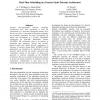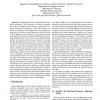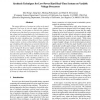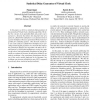114
click to vote
RTSS
1998
IEEE
15 years 6 months ago
1998
IEEE
Previous ultra-dependable real-time computing architectures have been specialised to meet the requirements of a particular application domain. Over the last two years, a consortiu...
114
click to vote
RTSS
1998
IEEE
15 years 6 months ago
1998
IEEE
Schedulability analysis of fixed priority preemptive scheduled systems can be performed by calculating the worst-case response-time of the involved processes. The system is deemed...
112
click to vote
RTSS
1998
IEEE
15 years 6 months ago
1998
IEEE
Abstract: The QoS-based Resource Allocation Model (QRAM) proposed in [20] presented an analytical approach for satisfying multiple quality-of-service dimensions in a resource-const...
117
click to vote
RTSS
1998
IEEE
15 years 6 months ago
1998
IEEE
We propose a unifying method for analysis of scheduling problems in real-time systems. The method is based on ACSR-VP, a real-time process algebra with value-passing capabilities....
100
click to vote
RTSS
1998
IEEE
15 years 6 months ago
1998
IEEE
: The Time-Triggered (TT) model of computation is a model for the representation and analysis of the design of large hard real-time systems. Central to this model is the concept of...
RTSS
1998
IEEE
15 years 6 months ago
1998
IEEE
162
click to vote
RTSS
1998
IEEE
15 years 6 months ago
1998
IEEE
The energy efficiency of systems-on-a-chip can be much improved if one were to vary the supply voltage dynamically at run time. In this paper we describe the synthesis of systems-...
115
click to vote
RTSS
1998
IEEE
15 years 6 months ago
1998
IEEE
In this paper, we derive a statistical delay guarantee of the generalized Virtual Clock scheduling algorithm. We define the concept of an equivalent fluid and packet source and pr...





